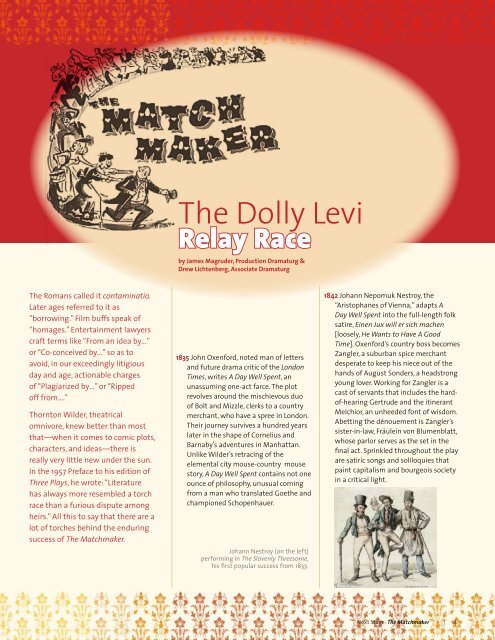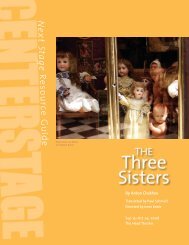The Matchmaker - Center Stage
The Matchmaker - Center Stage
The Matchmaker - Center Stage
Create successful ePaper yourself
Turn your PDF publications into a flip-book with our unique Google optimized e-Paper software.
<strong>The</strong> Romans called it contaminatio.<br />
Later ages referred to it as<br />
“borrowing.” Film buffs speak of<br />
“homages.” Entertainment lawyers<br />
craft terms like “From an idea by…”<br />
or “Co-conceived by…” so as to<br />
avoid, in our exceedingly litigious<br />
day and age, actionable charges<br />
of “Plagiarized by…” or “Ripped<br />
off from….”<br />
Thornton Wilder, theatrical<br />
omnivore, knew better than most<br />
that—when it comes to comic plots,<br />
characters, and ideas—there is<br />
really very little new under the sun.<br />
In the 1957 Preface to his edition of<br />
Three Plays, he wrote: “Literature<br />
has always more resembled a torch<br />
race than a furious dispute among<br />
heirs.” All this to say that there are a<br />
lot of torches behind the enduring<br />
success of <strong>The</strong> <strong>Matchmaker</strong>.<br />
the Dolly levi<br />
Relay Race<br />
by James Magruder, Production Dramaturg &<br />
Drew Lichtenberg, Associate Dramaturg<br />
1835 John Oxenford, noted man of letters<br />
and future drama critic of the London<br />
Times, writes A Day Well Spent, an<br />
unassuming one-act farce. <strong>The</strong> plot<br />
revolves around the mischievous duo<br />
of Bolt and Mizzle, clerks to a country<br />
merchant, who have a spree in London.<br />
<strong>The</strong>ir journey survives a hundred years<br />
later in the shape of Cornelius and<br />
Barnaby’s adventures in Manhattan.<br />
Unlike Wilder’s retracing of the<br />
elemental city mouse-country mouse<br />
story, A Day Well Spent contains not one<br />
ounce of philosophy, unusual coming<br />
from a man who translated Goethe and<br />
championed Schopenhauer.<br />
Johann Nestroy (on the left)<br />
performing in <strong>The</strong> Slovenly Threesome,<br />
his first popular success from 1833.<br />
1842 Johann Nepomuk Nestroy, the<br />
“Aristophanes of Vienna,” adapts A<br />
Day Well Spent into the full-length folk<br />
satire, Einen Jux will er sich machen<br />
[loosely, He Wants to Have A Good<br />
Time]. Oxenford’s country boss becomes<br />
Zangler, a suburban spice merchant<br />
desperate to keep his niece out of the<br />
hands of August Sonders, a headstrong<br />
young lover. Working for Zangler is a<br />
cast of servants that includes the hardof-hearing<br />
Gertrude and the itinerant<br />
Melchior, an unheeded font of wisdom.<br />
Abetting the dénouement is Zangler’s<br />
sister-in-law, Fräulein von Blumenblatt,<br />
whose parlor serves as the set in the<br />
final act. Sprinkled throughout the play<br />
are satiric songs and soliloquies that<br />
paint capitalism and bourgeois society<br />
in a critical light.<br />
Next <strong>Stage</strong>: <strong>The</strong> <strong>Matchmaker</strong> |









